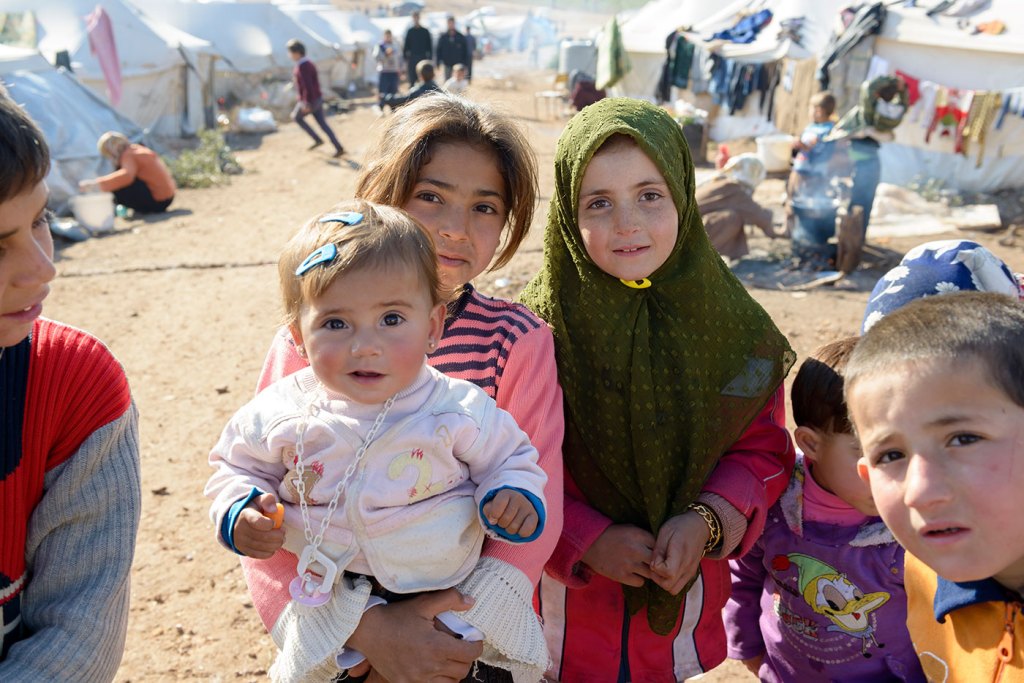Students up close and personal with the Syrian refugee crisis

It was summer 2014 and a group of Northeastern University students were in Jordan on a Dialogue of Civilizations program. The students were working to bring some semblance of relief to the lives of Syrian refugees in the country, hundreds of thousands of whom had fled their war-torn homeland. As part of the faculty-led study abroad program, the young humanitarians had traveled from the country’s capital of Amman to Mafraq, a city located just six miles west of the Zaatari refugee camp, and now they were painting a school, planting a garden, playing soccer with some kids.
“We did what we could at the time,” political science professor Denis Sullivan recalled, “and students got an up-close and personal look at the crisis.” But Sullivan, who was leading the dialogue, was not satisfied, knowing that much more could be done to transform the lives of the displaced. He had led a dialogue to Jordan in each of the past three years, watching closely as more and more refugees flooded into the country. And now he was motivated to tackle the worst humanitarian crisis in the world today, a crisis that has claimed some 4.6 million victims.
The severity of the humanitarian concern has driven me to find solutions and motivated me to improve the economic health and standard of living for Syrian refugees.
—Leen AlHajjar, SSH’17
After returning from the program in Jordan, Sullivan wanted talented students, faculty, and scholars to come together to investigate this problem and propose policy solutions. He mobilized scholars from Northeastern, Boston University, Harvard University, and the American University of Beirut—as part of the Boston Consortium of Arab Region Studies he founded in 2013—to carry out fieldwork in Jordan refugee camps, seeking to understand the roots and ramifications of the crisis on the broader region.
Student-driven and experiential
Over the past two years, dozens of Northeastern students have connected with the consortium to conduct research and organize workshops. Their experiences, they say, have expanded their academic horizons, propelled them to the top of the candidate pool for prestigious co-op positions, and shaped their career paths.
My co-op employers noted that my experience in the Middle East set my application apart from most of my peers.
—Farhana Hussain, SSH’16
A prime example is Farhana Hussain, SSH’16, a fifth-year international affairs major with a concentration in Middle East studies. Hussain spent the past two summers in Jordan and Oman, conducting research into how to better manage the deluge of Syrians who had flooded into the refugee camps there. Her work, she said, helped her land a pair of impressive co-ops and compelled her to pursue a master’s degree in international security and Middle East studies with the goal of someday working for the federal government.
“My co-op employers noted that my experience in the Middle East set my application apart from most of my peers,” said Hussain, who worked for the NATO Defense College in Rome, Italy, and the Atlantic Council’s Middle East Peace and Security Initiative in Washington, D.C. “Helping BCARS has honed my research and writing skills as well as my understanding of U.S. security interests in the Middle East.”
Leen AlHajjar, SSH’17, recently joined the team. A third-year student of economics, international affairs, and social enterprise, she is currently working on integrating Syrian refugees into the Jordanian economy through her co-op with the U.N. Refugee Agency in Amman.
AlHajjar, who grew up in Saudi Arabia, believes that it is incumbent upon her and her fellow Arabs to help solve the humanitarian disaster. “The severity of the humanitarian concern has driven me to find solutions and motivated me to improve the economic health and standard of living for Syrian refugees,” she explained. “I have learned through my course work that targeted livelihood interventions are among the best possible solutions to empowering people who are fleeing from conflict zones such as the one in Syria.”
A consortium designed to make a difference
Sullivan founded the Boston Consortium for Arab Region Studies with a two-year, $500,000 grant from the Carnegie Corporation of New York. As co-director of Northeastern’s Middle East Center, he created the consortium with an eye toward mentoring young scholars and conducting research on a variety of hot-button issues in the Arab region.
The findings borne from the work of the consortium were presented in April at the Middle East Policy Council’s Capitol Hill Conference on the Syrian Humanitarian Crisis, where attendees included representatives from the United Nation’s Special Commission on Syria.
Back in Boston, the consortium hosts and co-sponsors lecturers, seminars, and workshops, convening hundreds upon hundreds of students with a keen interest in the Arab region.
Earlier this month, Sullivan received another two-year, $500,000 grant from the Carnegie Corporation of New York to further the forum’s mission. The funds will be used to support two new projects: One is expanding the consortium’s focus to include a study of the refugee crisis in the Balkans, with a particular emphasis on Serbia and Croatia. The other is working with the U.S. government, the United Nations, and the European Union to shape refugee policy, with a special focus on passing legislation that would allow Syrian refugees in Jordan, Lebanon, and Turkey to work.




